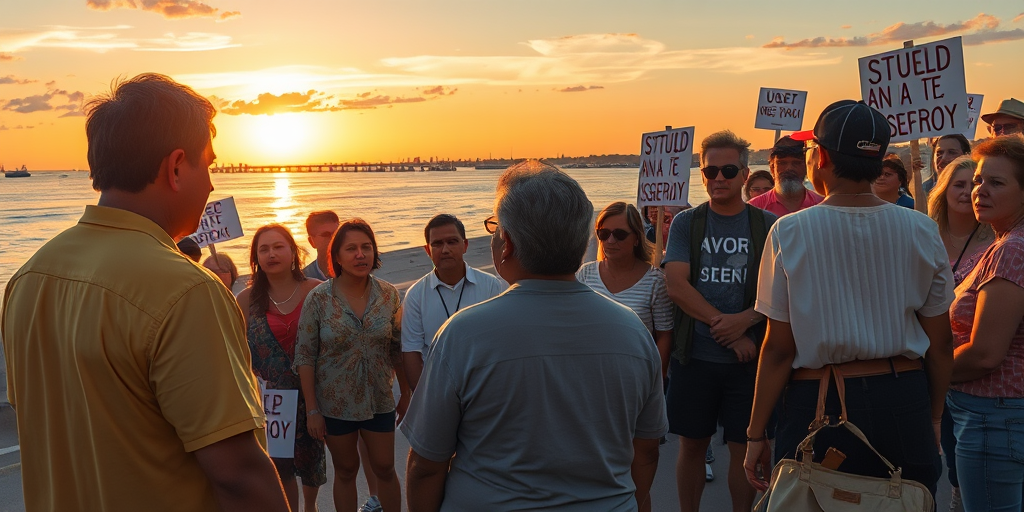Control of Highway 4 Handed to Starbase, Sparking Public Outcry
In a decision that has drawn widespread concern from Valley residents, Senate Bill 2188 and House Bill 4660 have transferred control of weekday closures of Highway 4 from Cameron County to the town of Starbase, a company town financially backed by SpaceX. This legislation, which affects the only public access route to Boca Chica Beach, has sparked significant public outcry across South Texas.
Legislative Background
The passage of these bills marks the culmination of a highly contested legislative process, characterized by intense opposition from community groups and local activists. The Surfrider Foundation South Texas Chapter, along with other community organizations, mobilized significant grassroots resistance against the bills through rallies and a persistent campaign of calls and messages to lawmakers. Despite their efforts, the bills were ultimately pushed through during the final days of the Texas legislative session, following an unexpected revote by the House State Affairs Committee.
The new law grants the newly incorporated town of Starbase the authority to manage Highway 4 closures from Monday to Thursday, with Cameron County maintaining control during the weekends. Previously, the county coordinated these closures in consultation with SpaceX, balancing the needs of spaceflight activities with public access to the important cultural and recreational site of Boca Chica Beach.
Community Reaction and Concerns
Critics have been quick to voice their concerns about the legislative process, arguing that the bills were passed through dubious means, contrary to public opinion. “It is with great sorrow and frustration that we announce we lost our campaign,” wrote the Surfrider Foundation South Texas Chapter in a public statement. They alleged that procedural shortcuts and legislative manipulation silenced public voices at the 11th hour, calling the move a betrayal of public trust.
Rob Nixon, Vice Chair of the Surfrider Foundation, emphasized that the community’s struggle was never about stopping space launches but preserving public access to Boca Chica Beach for those who have loved and utilized it for generations.
Official Justifications and Counterarguments
Proponents of the legislation, such as State Representative Jamie Lopez and Senator Adam Hinojosa, argue that the bill does not increase the frequency of beach closures and maintains protection for public access under the Texas Open Beaches Act. “This bill does not take Boca Chica Beach away from the public,” asserted Rep. Lopez in defending the measure.
However, opponents are wary of the precedent this sets, with power consolidated in a company town funded by SpaceX. They fear this could lead to potential conflicts of interest and a prioritization of corporate activities over public rights. “They’re calling it streamlined. We’re calling it a giveaway,” Nixon said, summarizing the sentiment of many community members.
The RGV’s Ongoing Struggle for Public Access
This legislative development is the latest in a series of efforts by Valley residents to preserve public control over vital local resources. The RGV community has persistently faced challenges balancing economic growth with environmental stewardship and public rights. The tension between the growth spawned by private enterprises like SpaceX and the preservation of public spaces has been a recurring theme in the region.
As Boca Chica’s future becomes increasingly intertwined with the ambitions of a private space enterprise, the fundamental question arises: Can economic growth coexist with public stewardship, or must one prevail over the other?
Next Steps for Continued Advocacy
Despite the setback, advocacy groups, including the Surfrider Foundation, remain committed to exploring all available avenues to reverse this decision. They draw inspiration from past successes in defeating similar legislative efforts and vow to keep fighting for unfettered public access to Boca Chica Beach.
For Valley residents interested in ongoing advocacy efforts or seeking to express their concerns, the Surfrider Foundation and other community organizations are rallying support and urging the community to stay engaged. Online resources and contact information for participating organizations are readily available for those seeking to join the fight.
Conclusion
The transfer of control over Highway 4 underscores the complex and sometimes contentious relationship between economic development and public rights. As the community adapts to this new reality, its commitment to advocating for public access and transparent governance remains strong. The debate surrounding Highway 4 is emblematic of broader issues facing Valley residents as they navigate the evolving landscape of South Texas development.







